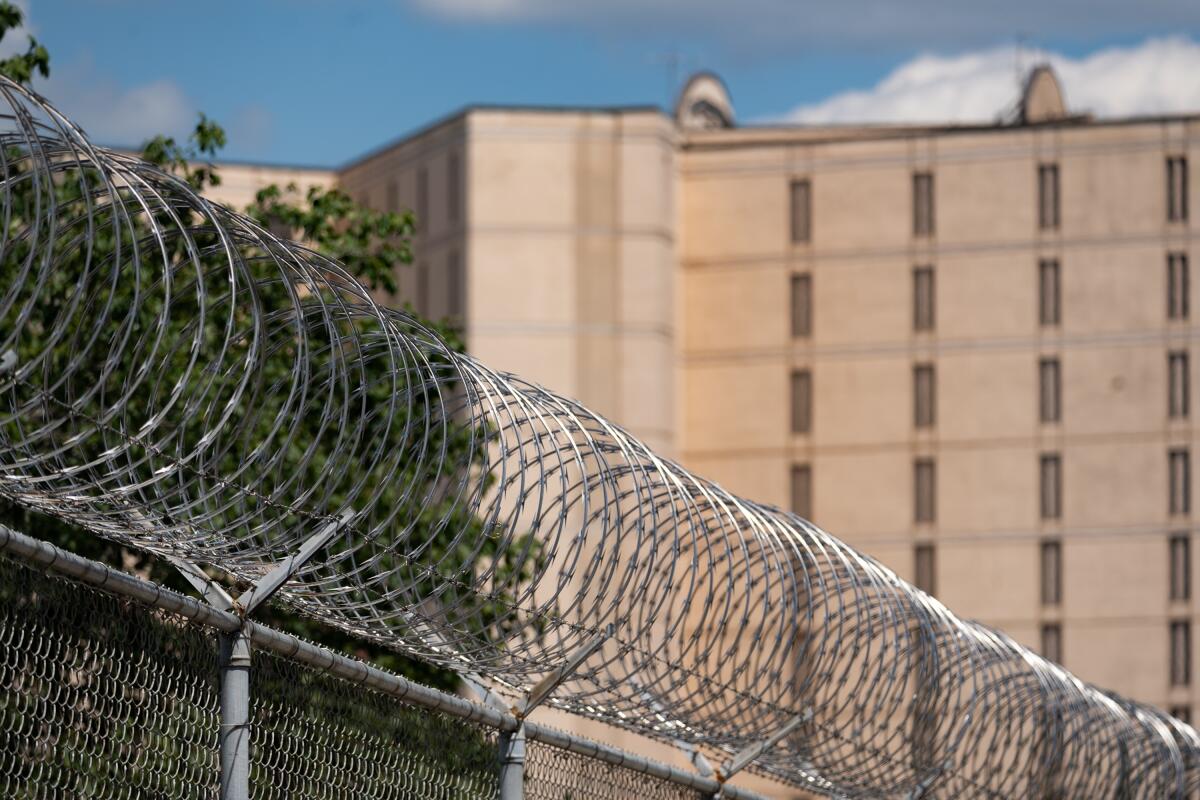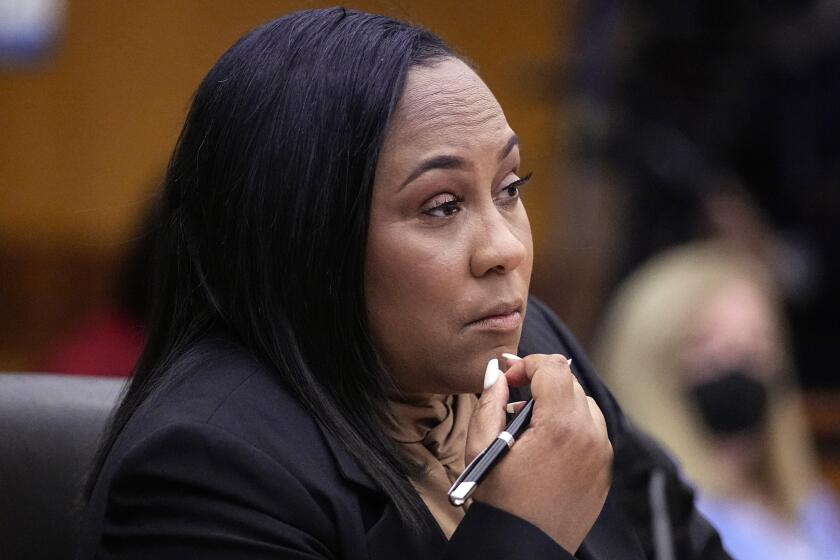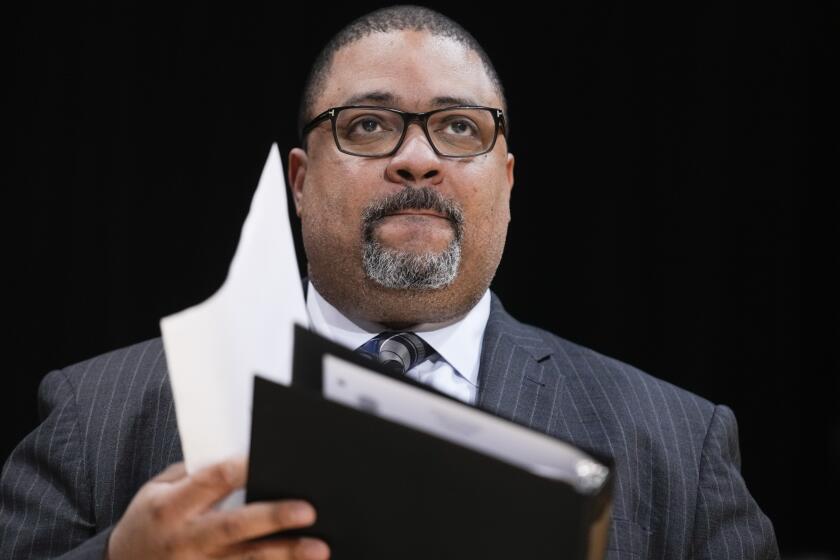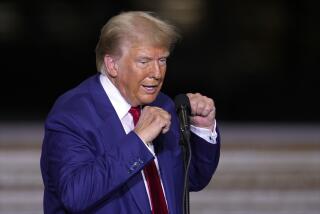Donald Trump just saw the inside of a jailhouse — and possibly his own miserable future

- Share via
Donald Trump, who has led a literally gilded life, got a close look Thursday at the grimy Fulton County Jail — the kind of facility where, if he is convicted of the charges brought by Dist. Atty. Fani Willis, he may spend the rest of his life. He couldn’t have liked what he saw.
Trump surrendered for booking the night before the deadline set by the district attorney prosecuting him in the alleged plot to overturn the 2020 presidential election result in Georgia. Trump’s moments inside the jail’s booking center were supposed to be marked by their ordinariness. County officials strove to treat the former president and his alleged co-conspirators like other defendants subject to the less than dignified procedure.
But Trump did receive some special treatment that distinguished him — for the worse — even from some of his 18 co-defendants in the sprawling racketeering case. He is now subject to a detailed set of conditions in return for the continued privilege of staying out of the county’s notoriously decrepit jail.
In addition to posting $200,000 bail, he must not intimidate any co-defendant or witness in the case “or otherwise obstruct the administration of justice.” And the court included another condition tailored to Trump by specifying that the communication restrictions apply to social media posts and reposts.
Fulton County Dist. Atty. Fani Willis also charged 18 others, including Rudy Giuliani and John Eastman, taking advantage of the state’s broad RICO statute.
Trump’s agreement to these conditions — and Fulton County Superior Court Judge Scott McAfee’s duty to protect court personnel and witnesses from intimidation and the jury from bias — provide ample authority to muzzle and punish Trump should he continue engaging in incendiary rhetoric about the case. But Trump’s track record provides every reason for concern that he will ignore his obligations and essentially dare the court to impose a gag order, hold him in contempt and put him in jail.
No one in the system wants that. Like U.S. District Judge Tanya Chutkan, who is overseeing the federal election interference case, McAfee is certainly aware of the ferocious blowback that would result from even briefly locking up the leading candidate for the Republican nomination for president.
The question, however, is whether Trump will leave the judge any choice. He may be determined to flout the order, concluding that he will be celebrated as a rebel for defying the authorities and a martyr if they bring him to heel. The showdown will only reinforce his claims that the Deep State is coming for him and by extension his supporters.
It will also raise the prospect that his rhetoric will inspire some crazed adherent among them to attack Willis or another player in the case. The ugly fact is that, as on Jan. 6, 2021, Trump may unleash violent forces he won’t be able to control.
Whether the case will remain in Fulton County’s jurisdiction is still in dispute. Several of Trump’s co-defendants — including his onetime chief of staff, Mark Meadows, and former Assistant Atty. Gen. Jeffrey Clark — are already trying to move the case to federal court. Among other advantages, a federal forum would draw from a broader and potentially more pro-Trump jury pool than in Fulton County and would likely preclude televising the trial.
But Trump’s own prospects of removing the case to federal court on the grounds that it concerns presidential acts are remote. Courts have already held that his alleged criminal conduct was outside even the outer perimeter of his official duties.
New York prosecutor Alvin Bragg’s investigation is just the beginning of Trump’s legal exposure. Charges in Georgia and from Special Counsel Jack Smith also loom.
Trump’s exposure in Fulton County is in some ways even more acute than in any of the other three indictments that name him. Because the case alleges state crimes, the presidency would give him no power to pardon himself or anyone else being prosecuted, reducing his leverage over the other defendants.
Kenneth Chesebro’s motion for a speedy trial is one early example of a co-defendant’s self-interest taking precedence over Trump’s interests. McAfee agreed to schedule Chesebro’s trial for Oct. 23, and Trump’s team moved for their cases to be separated from each other.
Former Georgia Republican Party Chair David Shafer’s motion this week to move his case to federal court also demonstrates this threat to Trump. Shafer argues that he and the other fake presidential electors acted at the direction of Trump and other federal officials. His filing includes a transcript in which Ray Smith, a Trump team lawyer and another co-defendant in the case, told Shafer and others that they were duty-bound to execute the phony elector scheme to support the president and the Constitution.
And there’s a strong possibility that one or more of Trump’s 18 co-defendants, not to mention the 30 or so unindicted co-conspirators, will cooperate with prosecutors because the evidence against them is strong and any evidence they can provide against higher-level players, especially Trump, will be valuable. If it comes to it, incarceration is a nightmare even for those not accustomed to the high life.
Trump might nevertheless be able to forestall justice for himself, if not prevent it altogether, if he becomes president again. It’s my view that the Supreme Court could find that the Fulton County proceedings would have to be held in abeyance until the end of his term. And who knows what damage to the rule of law Trump may have wrought by then?
There are reasons to believe the Fulton County case is unlikely to be completed before the November 2024 election. But it won’t be going away either. For Trump, conviction and incarceration in Georgia remain among the most frightening perils in the legal minefield awaiting him.
Harry Litman is the host of the “Talking Feds” podcast. @harrylitman
More to Read
A cure for the common opinion
Get thought-provoking perspectives with our weekly newsletter.
You may occasionally receive promotional content from the Los Angeles Times.












